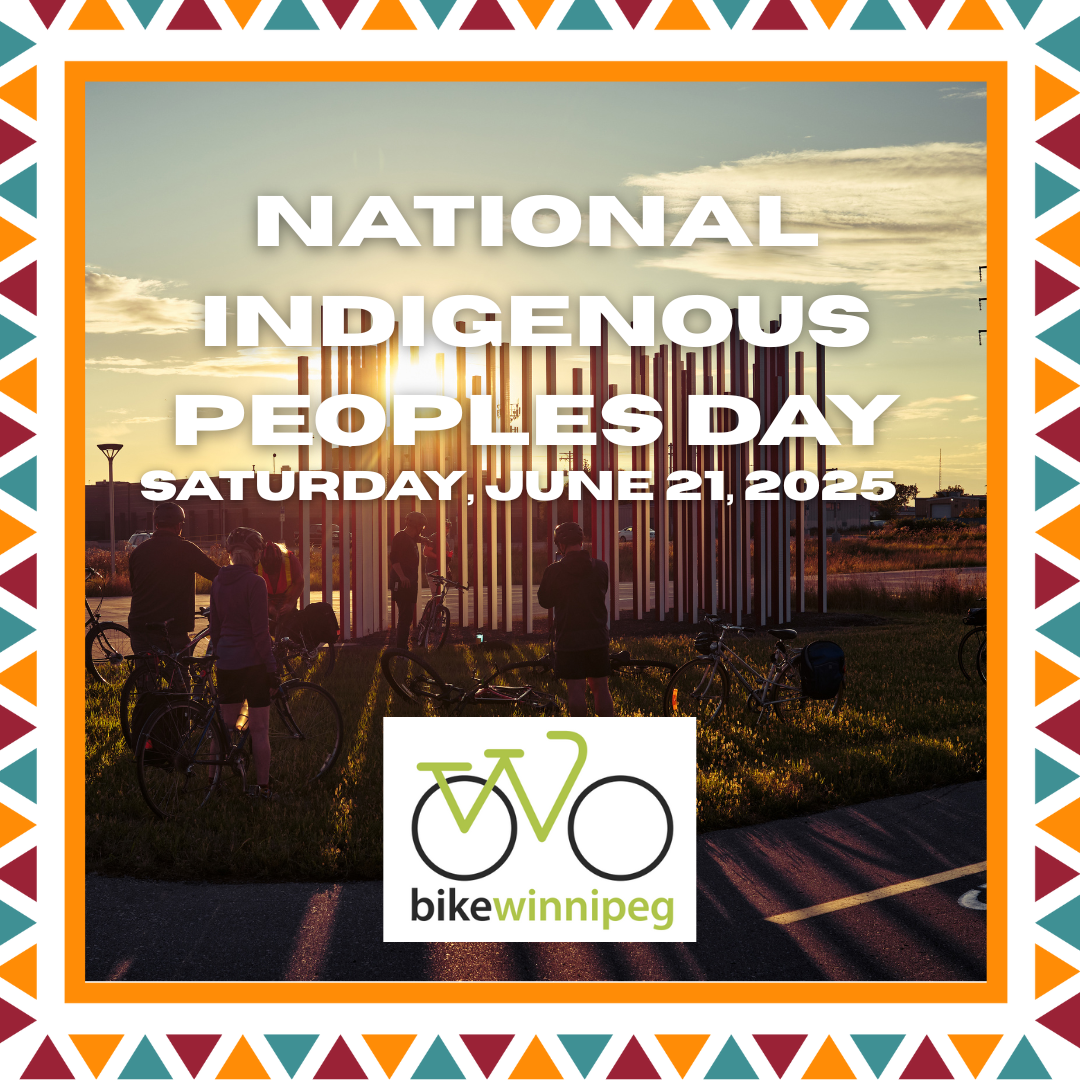Today, on National Indigenous Peoples Day, we pause to reflect on the lands beneath our wheels—the original territories of the Anishinaabeg, Ininiwak/Nehethowuk, Anisininew, Dakota Oyate, and Dënësułiné Peoples, and the homeland of the Red River Métis Nation.
These roads, these rivers, these pathways carry stories far older than the city around them. They hold treaties, promises, and a relationship we are still learning to honour.
We acknowledge the sacred source of Winnipeg’s water in Shoal Lake 40 and Iskatewizaagegan #39, and the lands of Treaties 1, 3, and 5 that power our homes. Colonialism reshaped this place, but Indigenous resilience and stewardship endure.
Today and every day, we commit to listening, learning, and moving forward in the spirit of Truth and Reconciliation—not just in words, but in action. And one way we can do that is by reimagining how active transportation—walking, cycling, and community mobility—can help answer the Truth and Reconciliation Commission’s Calls to Action.
1. Language & Culture (Call 14.iv): Pathways That Speak
“The preservation, revitalization, and strengthening of Aboriginal languages and cultures are best managed by Aboriginal people and communities.”
What if our bike trails could teach us? Imagine routes with Indigenous-language signage, rest stops featuring local history, or community-led rides sharing stories of the land. Supporting Indigenous-led trail projects isn’t just about infrastructure—it’s about weaving language and culture into the places we move through every day.
2. Health Equity (Calls 19 & 20): Mobility as Medicine
“Close the gaps in health outcomes between Aboriginal and non-Aboriginal communities.”
Bikes and walking aren’t just transportation—they’re tools for well-being. Safe, accessible pathways can mean better access to healthcare, fresh food, and social connection. In Indigenous communities where distances are vast and resources scarce, active transportation can be a lifeline for physical and mental health.
3. Justice & Community (Calls 27 & 31): Wheels of Change
“Provide realistic alternatives to imprisonment for Aboriginal offenders and respond to the underlying causes of offending.”
Bikes build bridges. From mechanic training programs to cycling initiatives for youth, active transportation can offer skills, purpose, and connection. Organizations like The WRENCH have shown how bikes can be part of healing—what if we supported more Indigenous-led programs like this?
4. Reconciliation & UNDRIP (Calls 43 & 44): Decolonizing Our Routes
“Implement the United Nations Declaration on the Rights of Indigenous Peoples as the framework for reconciliation.”
Whose land are we biking on? True reconciliation in transportation means respecting Indigenous sovereignty in planning—whether it’s co-designing trails, ensuring equitable access, or honoring traditional pathways. It’s not just about where the route goes, but who decides how it’s built.
5. Youth & Connection (Call 66): The Next Generation Leads the Ride
“Fund community-based youth organizations to deliver programs on reconciliation.”
Putting youth in the driver’s seat—or the bike seat. Imagine programs where Indigenous youth lead rides, map culturally significant routes, or learn bike mechanics as a trade. Mobility is freedom, and investing in youth means investing in the future of reconciliation.
6. Sports & Activity (Call 89): Beyond the Bike Lane
“Ensure policies to promote physical activity are inclusive of Aboriginal peoples.”
Not everyone has access to arenas—but everyone deserves movement. Walking and cycling are among the most inclusive ways to stay active. By supporting Indigenous-led active transportation initiatives, we can help break down barriers to sport and play.
The Road Ahead
Reconciliation isn’t a destination; it’s the way we travel. For those of us who love bikes and believe in better cities, that means:
- Advocating for Indigenous-led transportation projects
- Learning the history of the land we ride on
- Supporting initiatives that connect mobility with culture, health, and justice
This National Indigenous Peoples Day—and every day—let’s pedal with purpose.
P.S. Dive deeper into the Truth and Reconciliation Commission’s Calls to Action and consider how your own rides can honor this land and its stories.
